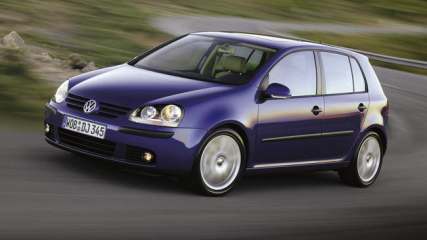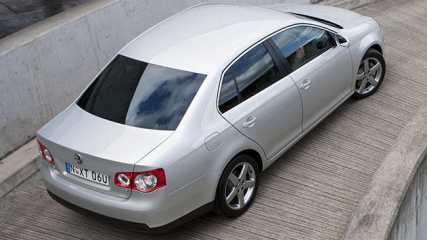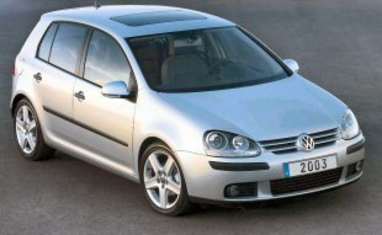Used Volkswagen Golf review: 2004-2009
By Graham Smith · 26 Apr 2012
NEW - If the BMW 3-Series was once the way of buying European prestige without breaking the bank that particular baton has been passed to the VW Golf.The Golf has become a popular choice for buyers wanting something more than the Japanese and Koreans can deliver, particularly in terms of driving excitement. Like all Europeans the Golf has exceptional road manners, it feels safe and solid with responsive steering, agile handling and comfortable ride.Available as a five-door hatch it's a fine all-rounder for anyone living within the confines of our traffic-choked cities. Its external dimensions are compact, but there's still decent room inside for four.Five is a squeeze, but then few of us ever drive with a full complement of passengers on board anyway. Behind the seating lies a good-sized boot for carrying whatever it is we need to haul around with us.There' s a good choice of engines, both petrol and diesel, including an economical 1.6-litre petrol four, a spirited 2.0-litre petrol four, and 1.9 and 2.0-litre turbo-diesels. It needs to be noted that the petrol engines require premium unleaded and there's no shortcutting that requirement without risking serious internal damage to the engine.VW also offered a wide choice of transmissions, with five and six- speed manuals, a six-speed auto with tiptronic shifting, and a six- speed DSG auto-shifting manual. With a five-star rating from ANCAP the Golf is right on the mark for safety, boasting a full complement of front, head and side airbags, with ABS braking, emergency brake assist and traction control.NOWVW enjoyed an extended honeymoon period after the company re-entered the market in its own right a few years ago. I t was an affordable way of buying European prestige, but the love affair has struck trouble in more recent times.The German carmaker has invested heavily in technology and its cars bristle with the latest engineering advancements, but it seems its advanced technology focus has brought with it a few issues that have caused owners considerable angst.The DSG gearbox, a wonderful gearbox when it's working properly, has been one subject of regular complaint here at Carsguide and owners have regularly complained that they have had difficulty in getting their issues resolved.Complaints about the DSG gearbox have typically been rough shifting, erratic shifting where it seems the wrong gear has been chosen, selecting neutral at the most inappropriate times. We have been given a copy of a technical bulletin issued to dealers advising them of a problem with oil fouling the wiring loom controlling the gearbox, which appears to be the cause of the shifting problems.When driving a DSG-equipped Golf it's vital that you conduct a thorough assessment of the gearbox looking for the above problems. There have been reports also of engine issues with owners having to replace engines at relatively low kilometers. VW claims the failures were due to owners using the incorrect fuel, but the jury is still out on that being the real cause.When considering a VW it's important to note that you must run the fuel specified by VW and that could mean higher running costs. Cutting corners could lead to even greater expense down the road.Window regulators have been known to fail, so make sure you check the operation of all windows, front and back. While the failures have been spectacular the build quality of the Golf is generally good.Before buying a used Golf find a good independent service specialist and you'll save heaps on servicing and repairs. It's also worth having a VW specialist go over any potential purchase to give you an independent report of the condition of the car.SMITHY SAYSA good driving car let down by some fairly serious mechanical flaws. Must be approached with caution, can be very expensive when things go wrong.VW Golf 2004-2009Price new: $27,990 to $35,290Engine: 1.6-litre 4-cylinder, 75 kW/148 Nm; 2.0-litre 4-cylinder, 110 kW/200 Nm; 1.9-litre 4-cylinder turbo-diesel, 77kW/250 Nm; 2.0-litre 4-cylinder turbo-diesel, 103 kW/320 NmTransmission: 6-speed auto, 6-speed DSG, 5-speed manual, 6-speed manual, FWDEconomy: 8.2 L/100 km (1.6), 8.5 L/100 km (2.0), 5.8 L/100 km (1.9 TD), 5.7 L/100 km (2.0 TD)Body: 5-door hatchVariants: Comfortline, Trendline, SportlineSafety: 5-star ANCAP









